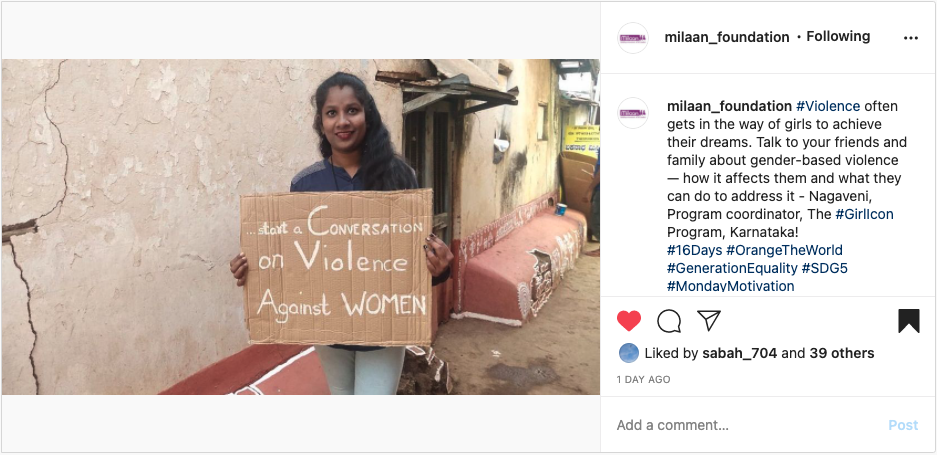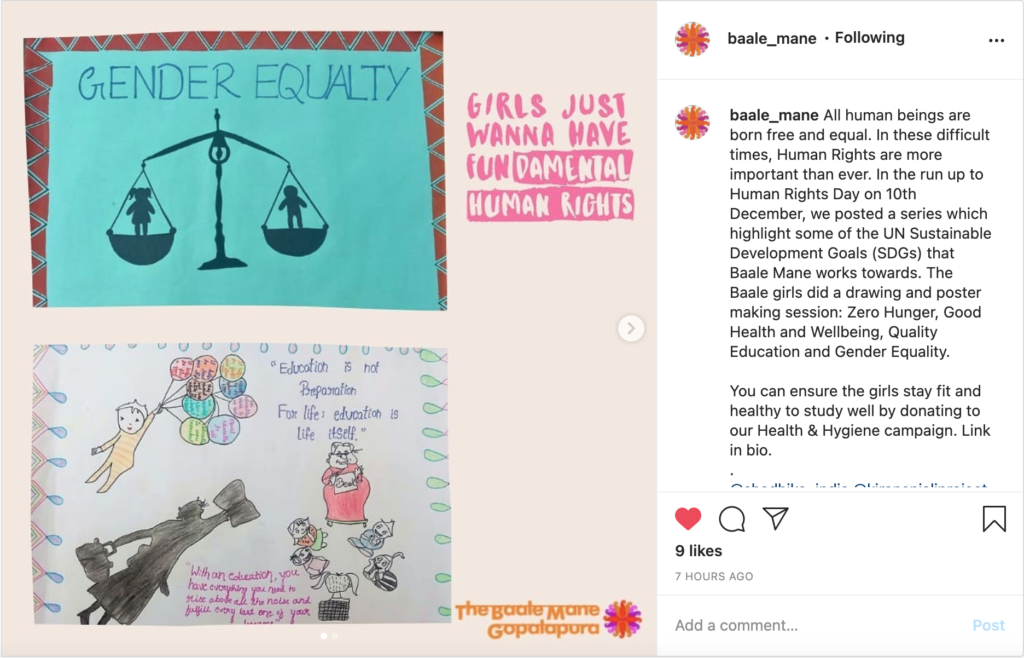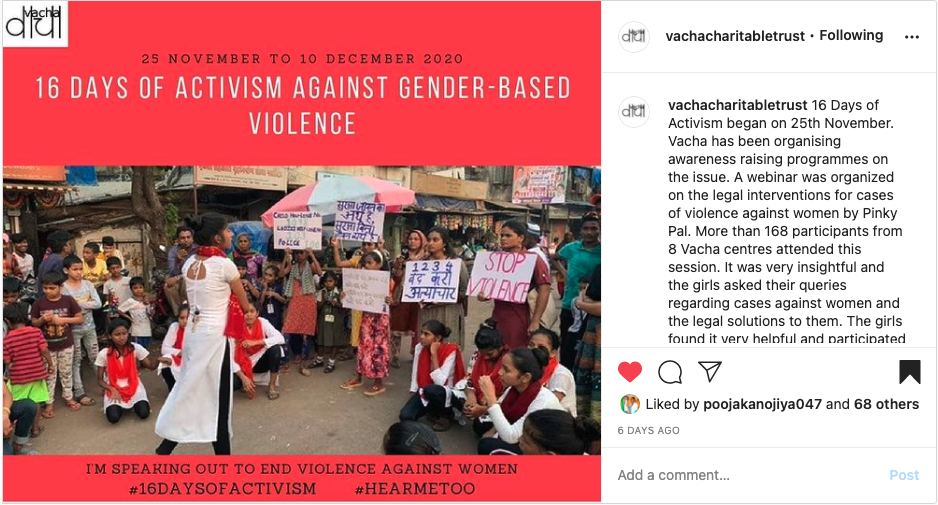Blog
Informing young women and girls, giving them space to speak, and to come together as a group a girl leaders to educate their communities brings a sense of solidarity among these rising leaders.
From the Field: December 2020
By Upasana Saha & Kendra Nicolai, Program Officers
December 8, 2020
Reading Time: 9 minutesViolence against women is a deep rooted and a complex global predicament which predominantly exists under every roof of a woman’s world. Some forms of violence are visible, however most are neglected as they remain invisible. Both forms of violence share a thin line of acceptability and often overlap or are pushed “under the rug” – normalized in the name of culture, tradition and modesty.
As WHO highlighted, three women in their lifetime have experienced physical/sexual violence. Sadly, in most countries, less than 40% of women who experienced violence sought help of any kind. India carries this double burden of excruciating sexual harassments, rape and many other forms of grave violence against women paired with vast under reporting of these episodes. The recent case of Hathras violence speaks aloud, how rape culture still holds an immovable position in the society and is cemented with patriarchy and India’s rigid caste hierarchy. Despite having a strong legal system that acknowledges violence against women as a heinous crime, the incidents don’t appear to slow down. Violence against women (VAW) and gender inequality exercised on women has become an indispensable part of socio-cultural conditioning and in men’s behavior, stems from the automatic power and privilege they learn from birth.
Similarly, it unfolds in an opposite direction for women as they are taught to be more adjusting, acceptable towards gender discriminatory and violent behaviors in their immediate and outer spaces. A well known author and speaker, Deepa Narayan, shares in her Ted Talk titled “7 Beliefs that can Silence Women,” she talks specifically about Indian women adjusting and keeping quiet. Shadhika’s Girls Writes program, a pen pal program between young women from our partner sites and pen pals from Equinix’s Women’s Leadership Network, are writing letters surrounding these ideas, with the goal of dismantling the belief that girls are taught since childhood.
To challenge this perennial problem of VAW, Shadhika’s mission talks about a cultural shift to empower young women to break the vicious cycle of gender inequity and violence. Coming out of this cycle can be a difficult process as it takes self realization, strength, resilience and an enabling environment to sustain the change. Additionally, on October 10th we celebrated International Day of the Girl with over 150 direct and indirect participants of Shadhika partner sites sharing the Girls Bill of Rights. Almost all girls identified the importance of “right to safety, freedom from all forms of violence and ability to seek justice” as a pressing need across all the 5 Shadhika partner sites in different states of India.
Shadhika supported project sites, program participants and scholars persistently advocate for women rights and freedom from VAW through different campaigns and community events. For this year’s 16 Days of Activism, Shadhika’s partners are working closely with program participants and scholars to plan small virtual and offline activities. Despite the lockdown and limited in person interaction, Shadhika young women never fail to collectively raise their voices against social injustices that impact their lives.
What are the 16 Days of Activism?
The 16 Days of Activism begin with the International Day for the Elimination of Violence Against Women on November 25th and end with International Human Rights Day on December 10th. The 16 Days highlight that violence against women is a fundamental violation of human rights.
Shadhika Partners on Gender-Based Violence and Rape Culture:
Milaan | Uttar Pradesh
Addressing gender based violence exists at the core of Milaan’s Girl Icon rights from the stage of program inception to impact. They have made intentional efforts to talk about it throughout the intervention with help of their curriculum, which has modules talking about forms of gender based violence and the importance of addressing it over not accepting it as norm. During the early days of lockdown, every report unfolded an increased cases of gender violence and discrimination all over India. To understand it better, 170 girls leaders of Milaan with support of Milaan were able to reach out to 17,000 young and adult women in Uttar Pradesh, India. The survey indicated most women felt with the lockdown they were compelled to live with the perpetrators in the same house, some women shared growing economic hardship was directly linked with domestic violence.

Sahiyar | Gujarat
Similarly, Sahiyar feels GBV is a deep rooted behavioral problem, that women have to face right from the time of her birth. Sahiyar has been working for more than a decade to provide support to the survivors of DV and sexual violence, and it has become more intense during the lockdown. They offer counseling and legal aid to the survivors of violence in collaboration with external agencies. Sahiyar, recognizes itself as an activist organization and recently did a direct intervention to support a survivor of rape who was raped by her own uncle in her family. The young women’s family wasn’t ready to report, however one of the Sahiyar+Shadhika program participants from the same community made a courageous decision to inform Sahiyar and help the victim get immediate justice.
Vacha | Maharashtra
Vacha hosted a three days webinar called ‘’Bole Kishori – Corona Ki Kahani, Kishoriyon ki Jubaani/ Girls Speak Out – Story of Corona Through Girls’ Narratives”. Each day focused on different thematic issues- girls education, agency, health, and violence. More than 240 girls from Vacha and 21 other NGOs took part in it. Day three focused on health, violence and safety issues of girls during the pandemic. Vacha+Shadhika supported peer leaders along with one of our Shadhika staff member, Sabah Siddiqui, participated as a panelist to discuss multifaceted challenges girl face due to the pandemic and lockdown. Issues around trafficking and early forced marriage came out as some of burning issues of GBV.
What are our partners doing for 16 days activism?
Baale Mane | Karnataka
Baale Mane will be celebrating Human Rights Day focussed around the United Nation’s Sustainable Development Goals. They will be sharing posts on their Facebook and Instagram to discuss the ways that they support the young women of Baale Mane to gain these rights. On the 10th, they will arrange an art competition with the girls, who will choose one of the SDGs in a team and do some artwork representing that right.

Vacha | Maharashtra
Vacha celebrates the 16 Days of Activism in their 17+ communities. As their program director Yagna mentioned: “…With lockdown restrictions and pandemic stress, most activities had to be scaled down and will be delivered in an online and offline combination.” Vacha Community mentors throughout the lockdown have been working tirelessly to ensure girls continue to feel safe and heard. They are organizing small group meetings to plan activities and topics in consultation with the young women. Girls want to make posters with slogans and images on GBV to place in community halls and areas to create mass awareness. Older girls with smartphones have decided to take photos and do research on GBV and present/share their learnings with Vacha and younger girls and boys of the program. To help girls understand the legal system better. a one day workshop is also being organized with a woman police officer. The workshop will focus on how to report a FIR or lodge a complaint and what are their legal rights in case of sexual violence or harassment.

DAWN Initiative to End Gender Based Violence | Uttar Pradesh
Our partners at the DAWN Initiative to End Gender Based Violence in Uttar Pradesh launched their 16 days of Activism campaign with a district level interface meeting on November 24th between program participants and government duty bearers. Judicial Magistrate, Secretary District Legal Service Authority, Block Development Officer, and a local Hindi newspaper journalist participated in a direct conversation with Shadhika+DAWN program participants. The conversation around GBV and the role of the Indian legal system to safeguard women from violence was facilitated by one of our partners at Asian Bridge India Foundation. Over next few days, Shadhika+DAWN program partners are planning to leverage community level discussions on GBV through wall writing, poster making, street plays and film screening. As an outcome of one year program intervention, the program participants took a collective initiative and pledge to establish a DV grievance redressal group to address DV or any form of violence against women at village level and provide necessary support to the survivors of DV in consultation with them and partner NGOs.

Violence against women has risen since the pandemic has forced a lockdown throughout India and the world. Being stuck at home, with a perpetrator, with nowhere to go debilitates women and girls from seeking help. Silencing a girl takes away any opportunity to fight for their rights, to fight for their future and to stand on their own feet. The 16 days of Activism are more important this year than ever before, giving space for NGO’s like Shadhika’s partners, to formally address issues of VAW, Rape Culture and Gender Based Violence with young women and girls. Informing young women and girls, giving them space to speak, and to come together as a group a girl leaders to educate their communities brings a sense of solidarity among these rising leaders.
